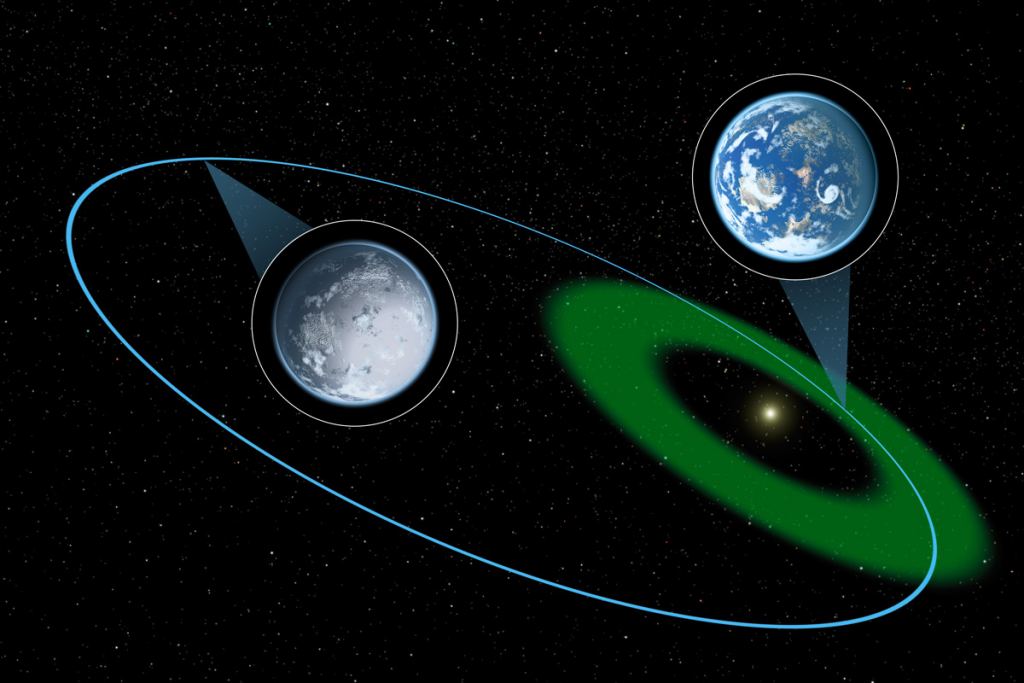When we think about finding life beyond Earth, especially on exoplanets, we immediately want to search for the next Earth, or Earth 2. 0. We want an exoplanet that orbits a star firmly in its habitable zone (HZ) with vast oceans of liquid water, and plenty of land to go around.
An exoplanet like that most certainly has life, right? But what if we’re looking in the wrong places? What if we find life on exoplanets that don’t possess the aforementioned characteristics, i. e. , Earth 2.
0? This is because some exoplanets have been observed to orbit their parent stars in some pretty wonky orbits, known as highly eccentric orbits , meaning noncircular orbits. Eccentricity is measured from 0 to 1, with 0 being a perfectly circular orbit and 1 being an extremely elongated orbit wherein the length of its orbit is far greater than its width. What this also means is that a highly eccentric exoplanet travels in and out of the HZ throughout the duration of its orbit, ultimately meaning this may or may not bode well for finding life on these worlds.
All things considered, could highly eccentric exoplanets potentially harbor life? “I certainly think it is a possibility,” said Dr. Tyler Robinson, who is an Assistant Professor in the Department of Astronomy and Planetary Science at Northern Arizona University, and an expert in planetary and exoplanetary atmospheres. “Like so many things, though, the perceived likelihood of harboring life will depend on key details.
Just how eccentric? How quickly does the planet rotate for its day/night cycle? An atmosphere and oceans provide some buffer against heating and cooling events, but these protections could start to break down if a planet is receiving too much solar energy input. ” Remove All Ads on Universe Today Join our Patreon for as little as $3! Get the ad-free experience for life Within our own solar system, all the planets exhibit largely circular orbits with eccentricities close to 0, with Earth at approximately 0. 02 and Mercury exhibiting the highest eccentricity at 0.
2 . While eccentricity doesn’t play a role in determining a planet’s habitability, it does play a role on Jupiter’s Galilean moons : Io, Europa, Ganymede, and Callisto, with the first two exhibiting active geology since they are constantly being tugged and stretched by Jupiter’s immense gravity due to their mild eccentricities, while also tugging on each other, as well. Since we don’t observe highly eccentric orbits in our own solar system, what can highly eccentric exoplanets teach us about finding life beyond Earth? “The exploration of climates for planets in highly eccentric orbits is all about understanding the robustness of planetary climates to dramatic changes in the energy received at the top of the atmosphere,” said Dr.
Stephen Kane, who is a Professor of Planetary Astrophysics in the Department of Earth and Planetary Sciences at UC Riverside. “Although planetary orbits in the solar system are largely circular, there are many eccentric orbits in other planetary systems. If those planets are able to maintain habitable conditions through at least a major part of their orbits, then that could greatly expand locations where life is possible.
” Dr. Kane is interested in multiple highly eccentric exoplanetary systems, saying he is a “big fan” of the Kepler-1649 system. This is due to the system possessing both an Earth and Venus analog that he says can be used to compare directly to our own solar system, and he was the lead author on a study published in The Astrophysical Journal in 2021 about Kepler-1649.
He is also interested in potentially habitable moons orbiting highly eccentric exoplanets, noting that WASP-47c travels both in and out of the HZ. Where will we find life beyond Earth? Will we find it on Earth 2. 0, a highly eccentric exoplanet, or even one of its moons? Exoplanetary systems have already demonstrated that very few solar systems mirror our own, so as the search for life beyond Earth continues at a fever pitch, so will the places we might be able to find it.
“Highly eccentric exoplanets have the potential to teach us about the importance of cycling in the origin of life,” said Dr. Robinson. “For our Earth, some have proposed that cycles were important for life’s origins — daily cycles of heating and cooling, wave cycles on a beach, or the monthly cycle of tides.
Maybe, then, a more-extreme annual cycle of seasons could help to originate life. Or maybe not!” As always, keep doing science & keep looking up!.
From: universetoday
URL: https://www.universetoday.com/158559/searching-for-life-on-highly-eccentric-exoplanets/



